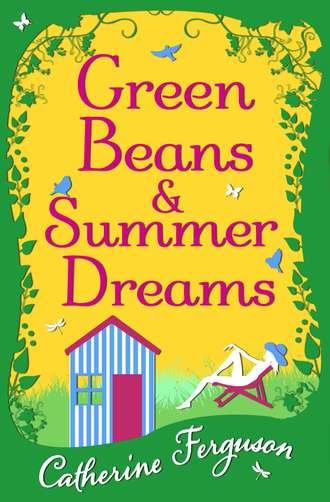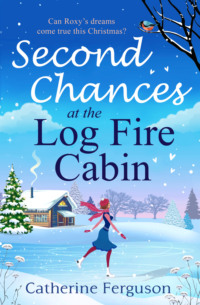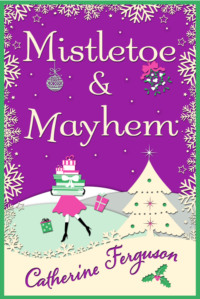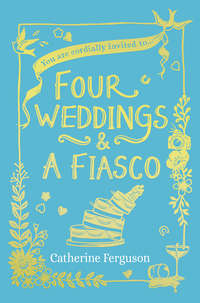
Полная версия
Green Beans and Summer Dreams
Anna shrugs. ‘It’s not my fault they’re a rhyming couplet. Back in a sec.’ She plonks her scarf on the table and rushes over to join Jess at the counter.
I smile, watching as she loops her arm round Jess’s shoulders.
Thank goodness for friends.
When Jamie and I first moved down here, the only person I knew was Jess. We’d met at Edinburgh University and she’d lived in the same flat as me for a while after we graduated. But then she’d found a job as a sub-editor on a newspaper in Surrey, where her family lived, and moved back down there.
We met Anna a year ago. She works as an events organiser, and Jess’s newspaper employed Anna’s company to set up a charity event for Comic Relief.
I remember Jess phoning me in a panic. She’d agreed to have lunch with Anna, who she barely knew, after the event. ‘She’s a bit – erm – whacky. Sort of loud. And very opinionated.’
Jess can be a bit shy with new people. She begged me to ‘drop by’ for support.
I laughed and said I would. So the three of us had lunch and actually, it turned out to be a riot. Anna kept us in stitches the whole time, waving her arms about in illustration and nearly sending a waiter’s tray of glasses flying. She was in the process of doing up a flat and was intrigued to see what I’d done with Farthing Cottage. So I invited her and Jess round for supper and we’ve been good friends ever since.
When we’re all settled and I have rediscovered the delights of Pecan Nut and Raisin Crunch, I turn to Anna. ‘So how’s Peter? Still whisking you off for a romantic weekend?’
Anna shrugs. ‘I think so.’
‘When?’
‘Next Friday.’ She picks up her spoon and toys pensively with the froth on her cappuccino.
‘You don’t look very excited,’ points out Jess.
Anna’s mouth twists. ‘Well, he’s not “the one”, if that’s what you’re thinking. We’re not “in lurve” or anything.’
I grin at her. ‘So what are you?’
‘We’re friends.’ She shrugs. ‘Friends who occasionally sleep together.’
I give her a look that says, forgive me if I’m sceptical but seeing Peter twice during the week and most Saturday nights does not, in my book, fall into the ‘occasionally’ category.
‘Peter’s lovely,’ sighs Jess.
It’s true. He’s a big, beefy guy with a soft centre. Funny and really laid-back. Plus it’s obvious he adores Anna.
‘He’s way too keen.’ Anna clatters the spoon back in the saucer. ‘I keep telling him I don’t want anything heavy but he’d still see me every night if he could.’
‘But why don’t you want a proper relationship?’ Jess asks anxiously.
‘Because I don’t, all right?’ snaps Anna. ‘And anyway, how’s Wes, Jess?’
Jess purses her lips. ‘It’s Wesley. And he’s fine, thanks.’
‘You said sex with Peter was the best you’d ever had,’ I remind Anna.
She rounds on me. ‘Well, you thought CLB was bloody perfect and look how that turned out.’
I grit my teeth. I really don’t need reminding.
‘Sorry.’ Anna presses my hand. ‘It’s just I could murder him for shagging around like that.’
Jess frowns at her. ‘He wasn’t “shagging around” as you so delicately put it.’ She turns to me. ‘He wasn’t, was he?’
I shake my head. ‘He was just shagging Emma.’ And that, of course, is even worse.
Anna places her palms on the table. ‘Well, it just confirms what I’ve always thought. Men look after themselves. Women look after each other.’
‘Speaking of which, I brought that job advert for you, Izzy,’ Jess announces as she delves into her bag.
As she rummages, a glossy magazine falls out onto the floor. The bride on the cover is a vision in satin and tulle, her honey-coloured hair piled up into an elaborate work of art. She is smiling a secret smile. And why wouldn’t she? She’s found perfect bliss and will be a princess for a day.
Jess shoots me a glance and shoves the magazine back in her bag as if it were red-hot porn.
She hands me the newspaper clipping. ‘One of our receptionists is going on maternity leave. Why don’t you try for it? I know it’s not PR but it might tide you over until you land something else?’
I pick it up and nod my head slowly as if I’m studying the advert. Then I look up at their watchful expressions.
‘The thing is… what I’ve decided to do…’ I place the clipping carefully on the table. ‘Well, I think it might be time for a change. I want to do something I really love. And I think gardening might be that something.’
There, I’ve said it.
‘So I was thinking I might try to turn the garden into a business.’
Two pairs of brows arch in bafflement. Either I have transmogrified into an alien or they fear they have greatly over-estimated the extent of my mental recovery.
‘You’re going to turn your garden,’ Anna repeats slowly, ‘into a business.’
There’s a further wedge of silence as they continue to stare.
Then a light goes on over Jess’s head. ‘Oh, you mean you’re going to open your garden up to the public? Like the National Trust?’ She frowns. ‘Is it big enough, though? I know you’ve got that field your Auntie Midge used to keep her rescue donkeys in, but even so—’
Anna snorts. ‘No, dumbo. She means grow potatoes and sell them.’ She looks at me doubtfully. ‘Is that what you mean?’
‘Well, yes, I would be growing potatoes,’ I say, somewhat deflated. ‘But it would be much more than that.’
The excitement I felt at five this morning, when I woke with a plan, is ebbing away with depressing speed. But they’re both nodding so I plough on. ‘Remember last year when I grew all different kinds of crops? Well, there’s room to nearly quadruple the size of the plot—’
‘And this will pay your bills?’ interrupts Anna. ‘That’s a hell of a lot of potatoes, if you don’t mind me saying.’
‘But she’s not just growing potatoes,’ reminds Jess. ‘It’s carrots and leeks and—’
‘Yes, yes, I know that.’ Anna frowns. ‘The potatoes were metaphoric.’
‘Oh, right.’ Jess nods.
I shake my head at them. ‘You don’t understand. I wouldn’t be growing it all myself.’
Anna leans forward. ‘So who…?’
‘I’ve looked into it. There are companies based in London that sell a huge range of organic fruit and vegetables. Anything you want, really. So I’d get a delivery of all the basics – like potatoes, carrots and broccoli – and also some of the exotic stuff like bananas and pineapples.’
‘But where would you sell it?’ Jess frowns. ‘At a farmers’ market?’
‘No. I’d run a box scheme.’
Anna perks up. ‘Oh, I’ve heard of those.’
I nod eagerly. ‘I’d pack a selection of fruit and vegetables – the best available that week – and deliver them to customers’ houses. Probably one day a week to start with. Until word gets round and orders increase – which they would because I’d advertise in your newspaper, Jess.’
I sit back feeling pleased.
It’s not surprising I’m word perfect. I’ve been turning it over in my mind ever since I woke up at 5 a.m. in a panic about money.
Last month, the bank was lenient about the mortgage payment and I’ve since cashed in a few shares to boost my account. But once that money runs out, I’ll have no other choice but to put the house on the market.
There’s a lot riding on this box scheme idea.
It could be the answer to a prayer.
If I can make it work.
There’s a brief, digesting silence.
Anna and Jess are nodding earnestly, but I can tell they think I’m a crate of rotten apples short of a compost heap.
Then Jess leans forward. ‘So what is it about selling vegetables that appeals to you, Izzy?’
Her perplexed expression makes me want to burst out laughing. Apart from the fact that the question is gently patronising, she sounds like she’s interviewing me for an issue of The Good Life magazine.
‘Is it because you want to get back to a simpler way of living?’
‘Hmm. Yes.’ I nod solemnly and stare at the horizon (or what I can see of it through the coffee shop’s slightly smeary window). ‘Girls, I feel something profound tickling the very edge of my consciousness. An awakening, if you like. A realisation that I need to get back to nature.’
Ignoring Anna’s snort, I slap a hand to my chest. ‘I will de-clutter my life and eat only seasonal produce. I will turn my back on fashion and wear garments made out of the wool from my own pigs. I will throw my telly out the window and play board games instead.’
Jess looks startled. ‘Gosh, really?’
Sighing, I slump back in my seat and look sheepishly from one to the other.
‘No. It’s just the only bloody thing I can think of to get me out of this mess.’
Chapter Three
My plan to get back to running regularly is not going well.
It’s a clear, blue-skied morning and a light frost glints on the hedgerows. But as I lumber past, in the lane outside my house, I’m in far too much distress to admire the scenery. Each time I leap over a pothole, every molecule in my body screams enough!
What seemed like a good idea in the warmth of the kitchen, cradling my early morning cup of tea and looking out at Jack Frost’s handiwork, now feels like complete insanity. It’s all part of a ‘turning my life around’ thing – but I have a feeling this could turn out to be a jog too far.
Draughts of icy air blast into my lungs, making my eyes stream, and my thudding heart lets me know precisely how unfit I have become.
I make it to the end of the lane and flump down on the grass verge. Then I lie flat on my back as my chest continues to heave up and down, feeling mildly indignant that two passing motorists haven’t screeched to a halt to offer emergency mouth to mouth.
Yesterday, I was counting on Jess and Anna to encourage the fledgling entrepreneur in me. But I suspect they thought I was grasping at straws, with a plan born of complete desperation.
I can’t imagine why they would think that …
Driving home from the coffee shop yesterday, my spirits were low. My lack of self-belief and the motherly concern of my friends was a recipe for disaster. I was effectively back to square one, terrified to commit to my plan in case it backfired and left me even worse off than I was before. As I parked on the gravel by the front door and let myself in, I wondered if I should forget the whole thing and apply for the job on Jess’s newspaper instead. But the position was only temporary. So in six months’ time I would be right back where I started.
I went round switching on lamps then sat at the kitchen table and took the advert out of my bag. Even if I got the job, the salary was so meagre that once I’d paid my bills every month, there would be barely anything left. And the trouble with living in a quirky old farmhouse that has almost been refurbished, but not quite, is that things keep needing to be repaired.
I pulled on my wellies, unlocked the back door and stepped out onto the terrace.
Staring out over the vegetable plot to the sweep of lawn and the orchard beyond, a dead weight settled in my chest at the thought of having to sell up.
I adored the garden and read horticultural magazines the way some women devoured celebrity gossip. Despite never having grown my own vegetables until a year ago, it was undoubtedly a passion I’d inherited from my aunt.
From an early age, I was handling vegetables of all varieties, digging up carrots with their green leafy tops still intact, rubbing earth from tiny, earth-scented new potatoes and sitting beside Midge in the garden on summer afternoons, shelling peas that burst with sweetness in your mouth.
At lunchtime, we would pull up little gem lettuces, shaking soil from the roots and laying them in Midge’s straw basket alongside fragrant cucumbers and crimson radishes that made a peppery taste explosion on your tongue.
I crunched tart, home-grown rhubarb dipped in sugar and turned up my nose at supermarket tomatoes because they didn’t taste or smell anything like the perfect, blush-ripe beauties in my Aunt Midge’s garden.
By the time I came to live at Farthing Cottage, the vegetable garden was wildly overgrown, so I hacked everything back and started from scratch. I sectioned off an area in front of the terrace, and started planting the vegetables I remembered from my childhood. Last summer, we had a mad glut of green beans and ate them every day. But my all-time favourite was the home-grown asparagus, earthy and sweet, eaten freshly harvested and dripping with butter.
Standing there on the terrace, I gazed out over my little bit of paradise, past the slightly sloping lawn and the vegetable plot close to the house, to the two rows of fruit trees either side of a grassy path leading to the little wildflower meadow beyond. My eye wandered to the row of tall conifers at the foot of the garden that provided shelter from the northerly wind. And then to the field on my left, which Midge put to such good use, building a little shelter there for the donkeys she rescued.
I closed my eyes and tried to conjure up the glorious ripeness of summer when I’d spent whole days tending my plants in the warm, herb-scented air, willing them to grow and labouring as happily as the bees until my body ached. The flower borders around the lawn lay dormant right now but in high summer, they were a riot of colour, filled with delicate pink roses, lilac-blue geraniums and my childhood favourite, pinky-purple foxgloves.
Suddenly I was hit by a feeling of loss so powerful I had to sink down on a patio chair.
Whichever way you looked at my predicament – and I’d studied it from every possible angle – the logical solution was to sell Farthing Cottage, pay off the mortgage and rent a flat in Fieldstone.
But logical solutions weren’t always the answer.
Sometimes you had to go with your heart.
To lose Midge was devastating enough. But the thought of parting with her house to some complete stranger was just horrible.
I remained there, motionless, until my gloveless fingers felt frozen. Then I retreated inside, levered off my wellies and went into the kitchen. I curled into Midge’s chair by the window, smoothing my hands over the arms. The leather was old and cracked now but I would never part with it. Midge had said that, whatever challenge she faced, if she sat there for long enough, staring out over the fields, an answer would always come.
It was worth a try.
I focused on my apple and damson trees and the fields beyond the garden. I kept on staring, willing a miracle.
But then raindrops began to spatter against the window and the sky darkened – and it was clear no answer was going to jump magically into my head.
I laid my cheek against the soft leather of the chair back and a warm tear leaked out.
Far from feeling closer to Midge, I felt more alone than ever.
I’m startled from my engrossing daydream, lying flaked out on the grass verge, by the blast of a honking fanfare.
I scramble to my feet as a gang of grinning workmen zoom past in their van, making assorted hand gestures. I feel stupidly flattered until it occurs to me that I’m wearing a top and Lycra shorts that are way too skimpy now I’m a size bigger than I was in my running days. And they are, of course, workmen. Cheering big bazookas is part of their job description.
I decide to run back up the lane but two minutes in, my lungs are back on the protest line.
As I plod past, my nearest neighbour emerges from her cottage. A widow in her early seventies, I call her Mrs P because she has a surname I can’t pronounce. I raise a cheery hand in greeting and Mrs P, startled by the puce-faced apparition puffing past her gate at 7.30 in the morning, nearly drops her carton of milk.
I slow right down as I near my house, then walk the last few hundred yards, noticing as I go that one of the driveway gates is propped slightly out of alignment, as if it might crash to the ground at any second. I go to investigate, easing it gently back into place.
The gates don’t look much now but I can see beyond the rust. When they’re latched shut, as they are now, a delicate rose appears in the centre, and swirls like fine plant tendrils spread out in a series of graceful curls and spirals. They’re a fairytale creation – a labour of love by some long-ago craftsman – pounced on with glee by Midge during a trip to Italy. She had them shipped back to Britain and I remember one hot summer day, when I was about twelve, spending hours helping her to scrape away the rust with sandpaper then sitting cross-legged on the grass verge watching as she painted each swirl and spiral a delicate dove grey. Even now, the smell of paint takes me right back to that summer.
Jamie loosened the left-hand gate from its moorings but then the money ran out and he never got round to fixing it back into place. I’ve tied it with string to the gatepost but I get anxious when it’s windy and I always use the side entrance instead.
Back in the house I shower, have breakfast then collect some apples from my store in the shed to take along the lane to Mrs P.
I have a shadowy memory of Mrs P from the days when I used to visit Midge during my school summer holidays, and I’ve learned more about her through Midge’s diary.
When Jamie and I came to live at Farthing Cottage, I knocked on her door and asked her if she remembered me from way back, and she smiled wistfully and said of course she did. She invited me in and made me tea and we chatted for a while, sharing a few precious memories of Midge.
But I didn’t get to know Mrs P properly until about a month after Jamie left.
I’d got a raging toothache and had to psych myself up to drive to my dentist in Guildford. I put on my dark glasses and set out but half way down the lane, Hormonal Harriet shuddered to a halt.
The pain in my tooth was searing, and I fell on the steering wheel and sobbed.
After a while, Mrs P knocked on the window.
She took me inside and offered to make me a drink. I mopped my eyes with the lavender-scented handkerchief she gave me and sat back in the rocker, expecting hot, sweet tea served in a floral teapot with a strainer on the side.
One stiff brandy later (she absolutely insisted I join her), I’d told her the whole story of my break-up, my tooth was numb and I was feeling pleasantly uncoordinated.
‘Another?’ She crossed to the drinks cabinet and waggled the bottle.
I looked at my watch: 10.30 a.m. ‘Er, it’s a bit early for me, thanks.’
Her response was brisk. ‘Rubbish. It’s never too early for a small one.’ She refilled her own glass and turned to me with a wistful smile. ‘You know, you sounded just like Midge then. Or “Thelma” as I used to call her. She was always trying to make me behave, too.’
I smiled. ‘Why Thelma?’
‘Ah, well.’ Mrs P adjusted her glasses. ‘Remember Thelma and Louise? That was our all-time favourite movie. Midge was Thelma and I was Louise. She used to say to me, “Lou, when we’re both too old to hobble along to the garden centre on our own two legs, we’ll hire a Stingray Corvette, speed down to Dover and launch ourselves over those cliffs. I want to go out in a blaze of glory!”’
Laughter burst right out of me then because that was just so like Midge.
‘I used to say, “Count me in, Thelma. Just as long as we’re not too doddery to find the bloody cliffs in the first place.”’
We smiled at each other.
Her eyes were suspiciously shiny.
‘But why a Stingray whatever-it’s-called?’ I asked.
‘Stingray Corvette. My favourite car. Cars are my passion.’ She got to her feet. ‘Speaking of which, let’s go and have a look at your rust bucket.’
I followed her out and flipped the bonnet as she collected an oily rag and some tools. Then she did something with a wrench that made the engine spring to life at the first try.
After that, we got on famously and I found she wasn’t quite the sad, lonely widow I’d assumed she was. Despite being over seventy, she had a better social life than me. (Not that this was hard.)
Today, with my bag of apples, I’m suddenly worried 8 a.m. might be too early to call. But she answers the door as soon as I knock.
‘Ooh, lovely,’ she says, sniffing the apples.
She’s wearing purple-framed glasses that are surprisingly trendy and there’s a dusting of flour on her cheek. Her apron bears an image of a bronzed and rippling male torso.
‘I’m baking bread. For the WI,’ she says, beckoning me in.
‘Right.’ I’m trying hard not to look at the posing pouch down below. ‘I – er – didn’t know Fieldstone had a Women’s Institute.’
‘Oh, we don’t dear. The nearest branch is forty miles away, so we decided to invent our own.’
I suddenly recall an entry from Midge’s diary. ‘I know this! Your WI stands for Women Inebriated!’
She smiles. ‘You’re quite right. Midge must have told you. But we’ve updated it recently. Seeing as our combined age is about a thousand and two, me and the gals decided to change it to Wrinklies Inebriated.’ She winks. ‘But don’t spread it about.’
Laughing, I watch her spoon loose tea leaves into a pot.
‘You might meet my grandson,’ she says, half-turning. ‘He said he’d pop round early and fix my front door knocker. He’s got a free period at college.’
‘Oh. What’s his name?’
‘Erik. With a “k”. Lovely boy. I’m biased, naturally.’ She glances up. ‘He’s single.’
I smile politely. The last thing I need is Mrs P trying to fix me up. I do not need a college student toy boy.
To change the subject, I start telling her about my whacky idea for a business.
She nods slowly as she places a plate of Bakewell tart on the table. Then she sits down opposite me and stares pensively at the sugar bowl.
At least she’s not looking at me like I have two heads. The way Anna and Jess did. My stomach growls and I take a piece of tart.
‘I like it,’ she says at last, nut brown eyes bright with enthusiasm. ‘Beginning of a new year, people making resolutions to live a healthier life. What better start than buying a box of fresh fruit and vegetables every week? And they don’t have to lug them back from the shops because you’ll be delivering them right to their door. Have you got a name for the business?’
‘Not yet.’
‘You could have a brainstorming session with your friends. That’s what we did. It’s amazing what you can achieve in just ten minutes of shouting out ideas.’
I stop munching.
‘That’s what you did?’
‘Yes. And we came up with Oldies But Goodies.’ Her eyebrows rise. ‘Oh, didn’t you know about the business?’
‘No. This Bakewell tart is melt-in-the-mouth gorgeous, by the way.’
‘Good. We bake twenty-five of those every week for the Deli Café.’
I stare at her. ‘The Fieldhorn Deli Café?’
‘The very same. Sorry, dear, I thought you knew. I set up Oldies But Goodies a few years ago. We bake all the traditional favourites. Plus some inventions of our own.’
A thought occurs. ‘Pecan Nut and Raisin Crunch?’
‘My very own recipe.’
I stare at her. I’ve been enthusing about those biscuits for ages – and they started their days right here, in Mrs P’s kitchen?
Half an hour later, I head home with a bag of the famous cookies and a new enthusiasm for the box scheme. It’s a gamble pouring what little money I have into a venture that may or may not pay off. But sometimes you just have to take a risk.
Jamie might have no faith in me to succeed on my own.
But I’m determined to prove him wrong.
NOVEMBER
Shit, shit, shit, shit, shite!
Whoever described gardening as relaxing was either lying or rich enough to employ someone to do it for them. I truly have reached the end of my tether this time.







